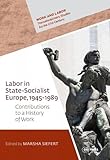Labor in State-Socialist Europe, 1945–1989 : Contributions to a History of Work / ed. by Marsha Siefert.
Material type: TextSeries: Work and Labor – Transdisciplinary Studies for the 21st CenturyPublisher: Budapest ; New York : Central European University Press, [2022]Copyright date: ©2020Description: 1 online resource (484 p.)Content type:
TextSeries: Work and Labor – Transdisciplinary Studies for the 21st CenturyPublisher: Budapest ; New York : Central European University Press, [2022]Copyright date: ©2020Description: 1 online resource (484 p.)Content type: - 9789633863381
- Labor -- Europe, Central -- History -- 20th century
- Labor -- Europe, Eastern -- History -- 20th century
- Socialism -- Europe, Central -- History -- 20th century
- Socialism -- Europe, Eastern -- History -- 20th century
- POLITICAL SCIENCE / Political Ideologies / Communism, Post-Communism & Socialism
- Communism, Central and Eastern Europe, Labor history, Protests, Self-management, Women
- 331.12/042094309045 23
- HD8380.7
- HD8380.7
- online - DeGruyter
| Item type | Current library | Call number | URL | Status | Notes | Barcode | |
|---|---|---|---|---|---|---|---|
 eBook
eBook
|
Biblioteca "Angelicum" Pont. Univ. S.Tommaso d'Aquino Nuvola online | online - DeGruyter (Browse shelf(Opens below)) | Online access | Not for loan (Accesso limitato) | Accesso per gli utenti autorizzati / Access for authorized users | (dgr)9789633863381 |
Frontmatter -- Table of Contents -- Acknowledgments -- List of Tables and Figures -- List of Abbreviations -- Introduction. Labor in State-Socialist Europe since 1945: Toward an Inclusive History of Work -- PART I: FINDING WORK, MAKING WORKERS -- Unemployment in State Socialism: An Insight into the Understanding of Work in 1950s Poland -- The Impossibility of Being Planned: Slackers and Stakhanovites in Early Socialist Romania -- Finding Workers to Build Socialism: Recruiting for the Steel Factories in Bulgaria and Albania -- “Inappropriate Behavior”: Labor Control and the Polish, Cuban, and Vietnamese Workers in Czechoslovakia -- PART II WORKERS, RIGHTS, AND DISCIPLINE -- Dishonest Saleswomen: On Gendered Politics of Shame and Blame in Polish State-Socialist Trade -- Labor Discipline in Self-Managed Socialism: The Yugoslav Automotive Industry, 1965–1985 -- “This Workers’ Hostel Lost Almost Every Bit of Added Value It Had”: Workers’ Hostels, Social Rights, and Legitimization in Hungary and the German Democratic Republic -- Discussing Women’s Double and Triple Burden in Socialist Yugoslavia: Women Working in the Garment Industry -- PART III: WORKERS, SAFETY, AND RISK -- Governing the State of Emergency: Large Industrial Accidents in Communist East Germany -- Labor’s Risks: Work Accidents, the Industrial Wage Relation, and Social Insurance in Socialist Romania -- Nuclear Yutopia: The Outcome of the First Nuclear Accident in Yugoslavia, 1958 -- PART IV: WORKERS, PROTEST, AND REFORM -- Strikes in Czechoslovakia, 1945–1968: Systems Analysis and the Debate over the Causes of the Collapse of State Socialism -- “It Shall Not Be a Written Gift, but a Lived Reality”: Equal Pay, Women’s Work, and the Politics of Labor in State-Socialist Hungary, Late 1960s to Late 1970s -- Labor Protest in the Italian-Yugoslav Border Region During the Cold War: Action, Control, Legitimacy, Self- Management -- When Workers’ Self-Management Met Neoliberalism: Positive Perceptions of Market Reforms among Blue-Collar Workers in Late Yugoslav Socialism -- PART V: TOWARD AN INCLUSIVE HISTORY OF WORK -- Not Just Socialist Miners, but Miners of the World: Internationalism, Global Trends, and Romanian Coal Workers -- List of Contributors -- Selected Bibliography -- Index
restricted access online access with authorization star
http://purl.org/coar/access_right/c_16ec
Labor regimes under communism in East-Central Europe were complex, shifting, and ambiguous. This collection of sixteen essays offers new conceptual and empirical ways to understand their history from the end of World War II to 1989, and to think about how their experiences relate to debates about labor history, both European and global. The authors reconsider the history of state socialism by re-examining the policies and problems of communist regimes and recovering the voices of the workers who built them. The contributors look at work and workers in Albania, Bulgaria, Czechoslovakia, the German Democratic Republic, Hungary, Poland, Romania, and Yugoslavia. They explore the often contentious relationship between politics and labor policy, dealing with diverse topics including workers’ safety and risks; labor rights and protests; working women’s politics and professions; migrant workers and social welfare; attempts to control workers’ behavior and stem unemployment; and cases of incomplete, compromised, or even abandoned processes of proletarianization. Workers are presented as active agents in resisting and supporting changes in labor policies, in choosing allegiances, and in defining the very nature of work.
Mode of access: Internet via World Wide Web.
In English.
Description based on online resource; title from PDF title page (publisher's Web site, viewed 30. Aug 2022)


